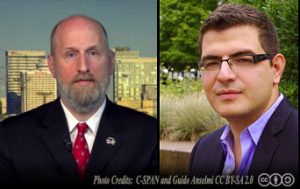
If you ask those who attended the debate between Sohrab Ahmari and David French at Catholic University, who won the encounter, you will get different answers. Some will say David French displayed superior legal knowledge and a lawyer’s logic. On the other hand, Sohrab Ahmari let loose some powerful jabs that asked the right questions.
However, most would agree that the packed September 5 event moderated by The New York Times writer Ross Douthat did not get to the core of the matter. The two sparred in the peripheries while not sure what was in the center. Nevertheless, the debate marked an important moment not so much for what was said but for what was left unsaid.
Setting the Stage
Ross Douthat sat in the middle of the stage, keeping the peace. He asked provocative questions and gave each a chance to present his views or rebut.
The recently converted Catholic, Sohrab Ahmari, is young and clean-shaven. His demeanor is calm and disarming. He is passionate about his position and can suddenly cut with remarks of surprising brutality. The Protestant David French is an older, graying man with a full beard. He is all lawyer and will argue with insistence and logic. He is sarcastic and biting in his remarks displaying a tinge of an evangelical preacher.
The debate was a continuation of a written polemic that raged over the summer between the two. Ahmari attacked what he calls “David Frenchism,” which he defines as “a program for negotiating Christian retreat from the public square into a safe, private sphere” carved out by legal exemptions. French defined his classical liberal position in terms of the documents of the Founders. He presented his record of defending First Amendment rights as a powerful weapon for Christian witness.
Help Remove Jesus Toilet Lid on Amazon
Inside the Constitutional Box
The debate immediately centered around the Drag Queen Story Hour, which Ahmari called a five-alarm cultural fire. French dismissed the events where transvestite men read LGBTQ-themed stories to three-year-old children at public libraries as insignificant when compared to other issues like pornography.
French’s arguments centered on the Constitution as a value-neutral framework that helps Christians by giving them space for their message. Take away protection from drag queens, he says, means taking away evangelizing opportunities for Christians who use public facilities. The French position favors tolerating and even defending the drag queens to secure a Christian place at the ever-more pagan table. The real way to change things is through private Christian revival rather than public governmental policy favoring the common good.
The match stayed in these constitutional grounds. Ahmari would criticize this framework as inadequate, self-censoring and defeating. French would defend the liberal consensus as being the best thing available under the circumstances. He would challenge his opponent to present concrete proposals that would pass present constitutional muster. Ahmari would deflect the questions yet never enter into the core of the matter.
Satanic Christ Porn-blasphemy at Walmart — Sign Petition
Approaching the Core
However, at the end of the debate, there was a quick entrance into this unknown core. Douthat forced French to admit that pornography lay outside the First Amendment rights as conceived by the Founders. He briefly ventured outside the value-neutral forum to affirm that the State has some interest in restricting an action deemed immoral.
The real debate—the one that didn’t happen—should have been about what might lie outside the present constitutional box. That is not to say that the solution must be anti-constitutional. Obviously, a moral order inside the Constitution is possible since an order that admitted right and wrong once existed in America. Solutions are well within the nation’s common law and Christian tradition.
The Debate That Should Have Been
The debate should have been about a moral framework to counter the immoral (and amoral) framework being thrust on society today. They should have asked why the constitutional order, which should be directed to the common good and the facilitation of the practice of virtue, has ceased to do so. On the contrary, the present dispensation favors the practice of every vice and makes virtue difficult. The government today promotes drag queens and persecutes Little Sisters of the Poor.
How Panera’s Socialist Bread Ruined Company
The debate should have been about defining and opposing the processes by which America is being destroyed. The Drag Queen Story Hour cannot be seen as an isolated event or even a single five-alarm fire. It must be inserted as the cutting edge of the cultural and sexual revolutions that aim to destroy all restraints and law. It will advance to ever-more radical standard-bearers beyond today’s drag queens. A core philosophy informs this process and unites liberal, progressive, LGBTQ and even Satanic elements around it. Failure to define and oppose this process and its philosophy condemn the conservative side to fight piecemeal, rearguard actions against an enemy that boldly progresses toward its anarchical goals.
The central question of the debate should have been about the moral relativism that dominates the governmental mechanisms that should defend morality and the common good. The debate should have denounced the liberal doctrines whereby acts are emptied of their (im)moral substance and made “neutral.” This “neutrality” provides a pretext for the brutal repression of morality and religion from the public square.
[like url=https://www.facebook.com/ReturnToOrder.org]
These are some issues that should have been debated but were not. However, the debate did open the door to these topics to an avid audience. Daring and imaginative conservatives should not be afraid to enter.


